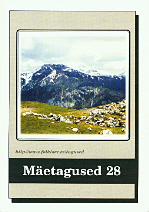Rahvakalendrist, astroarheoloogiast ja pidustuse tähtsusest ühiskonnas
Folk calendar, astroarchaeology and the role of festivity in the society
Author(s): Tõnu ÜlemaanteSubject(s): Customs / Folklore
Published by: Eesti Kirjandusmuuseum
Summary/Abstract: The article studies the festivities and holidays of the Estonian folk calendar, and their position in the yearly cycle. The author makes an attempt to indicate that the position of feast days and holidays in the calendar is not random, but follow a specific and clearly perceptible system. The system and, particularly, the specific dates of the holidays are based on an astronomical-mathematical construction rather than the climate and/or agricultural activities, which has been generally believed so far. This explains why the calendar holidays of several European countries coincide, regardless of the differences in life style and tradition. A closer look is taken on four Estonian folk calendar holidays, which date back to the period before Christianity: taliharjapäev (Jan. 14, the day when the backbone of winter is broken), künnipäev (April 14, the day marking the beginning of field activities), karusepäev (July 13) and kolletamispäev (Oct. 14, marking the end of field activities). These days fit in the calendar system which divides a year in sixteen parts, which have been associated with prehistoric, astronomically oriented megalithic constructions in Europe. This calendar system may have been known in Estonia, suggesting that similar astronomically positioned constructions could exist here; though, as far as it is known, archaeologists have not discovered any thus far. The article also discusses the role of folk calendar holidays in today's society. The fact that the Estonian folk calendar largely originates from the period of agrarian society explains why former traditions have lost their significance in modern urbanised life. However, since the article argues that many folk calendar holidays are based on specific astronomical phenomena rather than the cycle of agrarian activities, these holidays may not have lost their meaning and role in a modern, considerably transformed cultural environment.
Journal: Mäetagused. Hüperajakiri
- Issue Year: 2005
- Issue No: 28
- Page Range: 149-164
- Page Count: 16
- Language: Estonian

